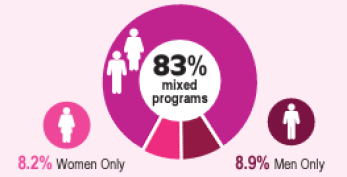

Delta 9‐tetrahydrocannabinol - a psychoactive compound found in cannabis - activates parts of the brain responsible for cognition, perception, anxiety, fear, memory and reward.
There are continuous debates about the link between cannabis...
The Illicit Drug Reporting System (IDRS) is an ongoing illicit drug monitoring system which has been conducted in all states and territories of Australia since 2000 and forms part of Drug Trends.
This year, we have provided a suite of...
The Ecstasy and Related Drugs Reporting System (EDRS) is an illicit drug monitoring system which has been conducted in all states and territories of Australia since 2003 and forms part of Drug Trends.
The EDRS consists of annual...
Globally, an estimated 15·6 million people aged 15–64 years inject drugs. Younger people who inject drugs are at higher risk of overdose, drug dependence, and blood-borne virus transmission and engaging in risky sexual behaviour.
In a...
Data from the 2019 Monitoring the Future Survey of 8th, 10th and 12th graders show alarmingly high rates of e-cigarette use compared to just a year ago, with rates doubling in the past two years.
The Monitoring the Future Survey...
The harm that tobacco causes is clear. Research has confirmed the damage that smoking has on an individuals wellbeing as well as the wellbeing of those around them. More than 7 million deaths a year are the result of direct tobacco use...
The 2019 National Drug and Alcohol Research Centre (NDARC) Annual Research Symposium was held on Wednesday, 16 October 2019 at the John Niland Scientia Conference and Events Centre, UNSW Sydney.
NDARC have put together a selection of...
NAADAC is happy to offer free addiction-specific education through its Free Webinar Series.
The 2019 Free Webinar Series releases two live webinars per month, which are then captured and made available for future viewing in NAADAC's...
Diazepam, first marketed as Valium, is a medicine of the benzodiazepine family. It is often used to treat anxiety, spasms, seizures and occasionally withdrawal.
Diazepam typically slows down the functioning of the body and produce a...
The Society for the Study of Addiction has uploaded the posters that researchers and students presented at the SSA Annual Conference 2019.
Poster categories:
In order to appropriately address the concerning global levels of substance use and substance use disorders, it is vital that staff are trained to deliver evidence-based treatment.
At the start of November 2019, the Education and...
Background
Cannabis use is decreasing in England and Wales, while demand for cannabis treatment in addiction services continues to rise. This could be partly due to an increased availability of high-potency cannabis.
Metho...
Research on abuse linked with substance use has tended to focus on child abuse and intimate partner violence.
There have been considerably fewer studies on the nature of abuse committed by children against their parents.
In a recent...
The “stages of change” or “transtheoretical” model is a way of describing the process by which people overcome addiction. The stages of change can be applied to a range of other behaviors that people want to change, but have difficulty...
The identification and treatment of the substance-abusing physician has led to outcome studies focusing on years of abstinence and resultant work performance, but little has been written addressing the therapeutic changes...
More often than not, the answer is: no.
A therapeutic relationship is an effective way to promote positive change in people. It involves building trust in order to encourage openness and honesty. This leads to better understanding...
The therapeutic alliance is well-recognized as an integral part of psychotherapy; however, there is little understanding of how it is best utilized in the treatment of substance use disorders (SUDs), particularly in young adults. In this...
Autores: Rodríguez Míguez E, Casal Rodríguez B, Rivera Castiñeira B.
Edita: Ministerio de Sanidad, Consumo y Bienestar Social, Secretaría de Estado de Servicios Sociales, Delegación del Gobierno para el Plan Nacional sobre Drogas; 2019
...Do you want the substance use professionals in your area to receive the International Certified Addiction Professional (ICAP) credential?
This webinar discusses how you can host testing for the ICAP certificates at your University.
...Share the Knowledge: ISSUP members can post in the Knowledge Share – Sign in or become a member